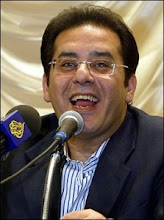Steven Stalinsky * The New York SunA former Egyptian parliamentarian and leader of Al-Ghad Party (the Party of Tomorrow), Dr. Ayman Nour, became an international cause celebre following his arrest last year by the Egyptian government for forging signatures on the petition to secure the formation of his new party - an allegation he has denied vehemently. He has been locked in a prison cell for the last 142 days or 3,408 hours.
According to freeaymannour.org, Al-Ghad stands for liberal and democratic values, with a focus on human rights. Other pillars of the party are encouraging constitutional reform, limiting presidential powers, and creating open, multi-candidate presidential elections in Egypt.
Freeaymannour.org offers up-to-date articles from the international press regarding Dr. Nour's case, as well as information from Western legislators who have spoken out on his behalf. For example, the site highlights U.S. House of Representatives Resolution 82, from March 3, 2005, which "express[ed] the grave concern of Congress" regarding Dr. Nour's arrest. A December 24 statement from the White House, which called Dr. Nour's five year prison sentence "deeply troubling," is also posted at freeaymannour.org.
The following are some examples of the dozens of personal letters and emails in support of Dr. Nour, from influential Europeans who also have been outraged by his imprisonment and are active in working to secure his release:
A text adopted by the European Parliament, "Urges the Egyptian authorities not to undermine the prospects recently opened ... to multi-candidate presidential elections, and to press ahead with democratic reforms; expresses its deep concern ... about the conviction of Ayman Nour ... regards this as a seriously retrograde step and calls on the Egyptian authorities to make every effort to ensure that this case is correctly dealt with." From a letter sent to freeaymannour.org by Czech politician Jana Hybaskova, member of the European Parliament, on March 8.
"[We the European Parliament] welcome and support the worldwide calls to release Ayman Nour and strongly urge the Egyptian authorities to ensure that Ayman Nour is well treated and not sub ject to torture or other ill treatment and to further ensure that he is given prompt, regular and unrestricted access to his lawyers, doctors (as he's diabetic) and family." A January 18 e-mail from an Italian politician and member of the European Parliament, Emma Bonino.
Most importantly, freeaymannour.org provides visitors an opportunity to sign a petition addressed to President Mubarak of Egypt urging Dr. Nour's release. It calls the prison sentence "an attack on the nascent initiative to a free political life in Egypt to move towards democracy and pluralism."
The petition asks the international community to support Dr. Nour and the struggle for a free and democratic Egypt. It states that all individuals and associations who care for the future of Egypt and of the Arab and Muslim world as a whole to add their signature.
To date there have been more than 600 signers including Dr. Nour's wife Gameela Ismail; Arab reformers, such as Saad Eddin Ibrahim; 27 members of the European Parliament from Finland, Britain, Italy, Sweden, the Czech Republic, Poland, France, and Germany; members of academia; journalists; activists; researchers; students; housewives; lawyers, and concerned citizens of the world.
The signers are from countries such as Egypt, Morocco, Iraq, Jordan, Tunisia, the Palestinian Territories, Algeria, Syria, Lebanon, Saudi Arabia, Kuwait, U.A.E., Libya, Spain, Switzerland, Thailand, America, Canada, Brazil, the Netherlands, Austria, Norway, and the Ivory Coast.
The Web site also requests visitors to "officially" ask Egyptian authorities to visit Dr. Nour in prison to help ensure his safety and to direct such requests to: 1. Habib el Adly, Egyptian minister of Interior, Lazoghly, Cairo, Egypt, Fax no. 202-795-7286. 2. General Mahmoud Wagdy, Head of the Egyptian prisons, Kolaly, Cairo, Egypt.





